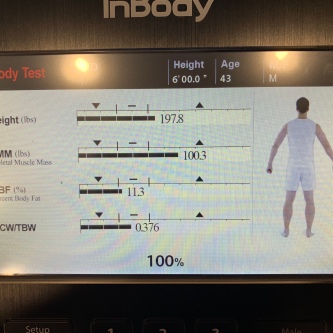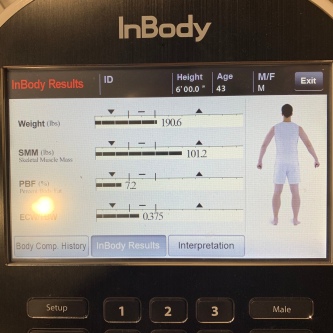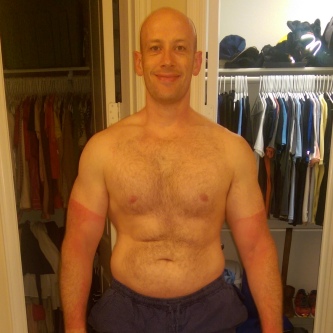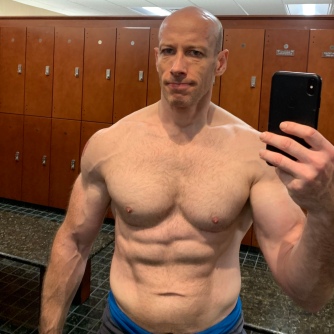Losing Weight Is Hard But Not Complicated
I re-blogged this post from a post on Wordpress. The author John Savill, writes about himself and how he won his battle with fat. I think this time of year we all could use an inspirational story.
I’ve been guilty in the past of telling people that it’s not hard to lose weight but that’s actually incorrect. The reality is that it’s not COMPLICATED to lose weight but it absolutely is hard but lets take a step back.
Before I start I’m not a doctor, I’m not a nutritionist, I’m not a personal trainer. In fact I’m completely unqualified  I don’t have a coach or a trainer. I have no one setting me a training plan or what to eat. I’ve always done what I think is logical. What I’m sharing here are my thoughts and what has worked for me. Nothing more, nothing less.
I don’t have a coach or a trainer. I have no one setting me a training plan or what to eat. I’ve always done what I think is logical. What I’m sharing here are my thoughts and what has worked for me. Nothing more, nothing less.
 I don’t have a coach or a trainer. I have no one setting me a training plan or what to eat. I’ve always done what I think is logical. What I’m sharing here are my thoughts and what has worked for me. Nothing more, nothing less.
I don’t have a coach or a trainer. I have no one setting me a training plan or what to eat. I’ve always done what I think is logical. What I’m sharing here are my thoughts and what has worked for me. Nothing more, nothing less.
Over the past 4 years there have been two occasions where I’ve lost weight. The first was 3 years ago after I completed my second IRONMAN and was starting to train for my third and decided I should shed some body fat so I had less weight to carry round with me. I was about 225 and the only picture I have was after the previous years IRONMAN where I had really bad sunburn  (I’ll show that in a minute
(I’ll show that in a minute  ) I got down to about 200 at around 12% body fat. This took about 4 months. I lost a little bit more over time at one point getting down to about 8.5% body fat and 193 lbs but recently was back up to about 11.5% fat and 200 lbs.
) I got down to about 200 at around 12% body fat. This took about 4 months. I lost a little bit more over time at one point getting down to about 8.5% body fat and 193 lbs but recently was back up to about 11.5% fat and 200 lbs.
 (I’ll show that in a minute
(I’ll show that in a minute  ) I got down to about 200 at around 12% body fat. This took about 4 months. I lost a little bit more over time at one point getting down to about 8.5% body fat and 193 lbs but recently was back up to about 11.5% fat and 200 lbs.
) I got down to about 200 at around 12% body fat. This took about 4 months. I lost a little bit more over time at one point getting down to about 8.5% body fat and 193 lbs but recently was back up to about 11.5% fat and 200 lbs.
The next occasion I just finished. I decided to get to 8% by the end of the year to set myself up for in 2019 focusing on fitness and building more muscle. At the start of November (2 months ago) I was at 197.8lbs and 11.3% body fat so 22.35 lbs of body fat. Today I weighed in at 190.6lbs and 7.2% body fat so 13.72 lbs of body fat. Basically 8.5 lbs of body fat loss in 9 weeks.
So over a total of 6 months of weight loss focus (spread over multiple years though) my before and after (and yes that sunburn really hurt  ).
).
 ).
).
My approach was slightly different each time. The first time my only focus was losing weight. I didn’t count calories I just basically removed all sweets, cakes, fast food, soda (which was a great thing and I’ve not drunk one now for 3 years) and most bread. I still ate my Friday pizza, still had pasta but really tried to focus on clean food. The weight fell off at about a pound and a half a week.
For this last 9 week weight loss attempt it was a little different. I wanted to lose body fat but not lose muscle and so wanted to control the weight loss and limit to about 1 lb a week. I used the Lose It app on the iPhone to log the food I ate and the exercise I did and aimed for 500 calorie deficit most days averaging about 3500 calorie deficit a week. This meant I still ate a lot of food and just altered things here and there to try and keep to 500 deficit.
I’m going to be up front about something now before we go on. I do a lot of training. Every day I do around 1.5 hours of cardio and 75 minutes of weight training. I train for Ironman events but also like to keep muscle mass so do quite a lot of weight training as well. On average this is about 1600 calories burnt which obviously means I get to eat them  On Saturdays I may do 5 hours of cardio for about 4500 calories
On Saturdays I may do 5 hours of cardio for about 4500 calories  I also have quite a lot of muscle mass which helps burn calories so I still get to eat a lot of food. That is not normal for most people but hopefully as you’ll see the logic remains the same for everyone, the numbers will just be different.
I also have quite a lot of muscle mass which helps burn calories so I still get to eat a lot of food. That is not normal for most people but hopefully as you’ll see the logic remains the same for everyone, the numbers will just be different.
 On Saturdays I may do 5 hours of cardio for about 4500 calories
On Saturdays I may do 5 hours of cardio for about 4500 calories  I also have quite a lot of muscle mass which helps burn calories so I still get to eat a lot of food. That is not normal for most people but hopefully as you’ll see the logic remains the same for everyone, the numbers will just be different.
I also have quite a lot of muscle mass which helps burn calories so I still get to eat a lot of food. That is not normal for most people but hopefully as you’ll see the logic remains the same for everyone, the numbers will just be different.Losing Weight, Not Complicated
Let’s get to the meat of losing weight and it’s not complicated. The laws of physics apply to us, specifically Einstein:
Energy cannot be created or destroyed, it can only be changed from one form to another.
As humans our energy comes from eating food and that energy is used by the activity we perform. If we have more energy coming in than we use then its stored as fat. If we use more energy than we have coming in then (mostly) that energy deficit is supplied by using our fat stores. I say mostly as our muscle can also be cannibalized for energy (and certain other materials) but all things being equal our body would rather burn fat than muscle for energy as it knows muscle is necessary and is required to help us hunt and run away from predators.
Therefore the not complicated part is basically to lose fat we just need to eat less energy than we are using through activities. The delta will mostly come from body fat.
A pound of body fat is 3500 calories so to lose a pound of fat we need to eat 3500 calories less than we are using. You see its not complicated, its just basic physics.
There are fancy diets and guidance that may help but for the most part its very simple, eat less than you use. Now there are some considerations.
- Go see a Dr before any big change!
- To avoid losing muscle as well as fat eat a good amount of protein (I aim for a gram of protein per pound of body weight minimum but obviously if you have a lot of weight to lose this ratio would not apply) and do some resistance training
- Don’t try and lose weight too quickly. I think a pound a week is a good amount, i.e. 500 calorie deficit a day. If you have more weight to lose then you’ll find it easier to lose weight initially so maybe 2 lbs a week
- Exercise will help since it burns calories but what they say is true, 80% of weight loss is in the kitchen, 20% at the gym. For years I did hours of training and put on weight because I ate so much
- While a calorie is a calorie, some are better than others. For example candy and cakes your body can’t do anything with other than initially store as fat where as real food can actually be used for energy. The body is constantly using fat and storing fat but if we can eat good food that will help
- Try not to eat a really large meal right before bed and instead aim for multiple smaller meals
- It’s OK to have things you enjoy. Think moderation. 80% good, 20% bad is OK, just make sure the bad does not completely offset the good
 I’ll have five guys little cheeseburger and little fries. Awesome!
I’ll have five guys little cheeseburger and little fries. Awesome! - Think overall health. Losing weight is great but we also want to improve fitness and think overall health. Watch saturated fats, think heart health. If you smoke stop
 Watch alcohol.
Watch alcohol. - Don’t cut out fat. We need fat and I think the body needs to know fat is coming in so it stays trained to burn fat.
- Drink lots of water!
- Enjoy special days. Christmas, New Years, Birthday, Valentines Day. Log the food (as best you can but can be difficult when you eat out) but don’t worry about it. A few bad days won’t really matter.
- Watch eating out. Large food chains have to publish nutrition but smaller ones don’t which means you really don’t know what you are eating. Assume its always worse than what you think.
I want to add something that I found to help me. Yes, you have to cut out processed foods, they contain too many things the body can't process and immediately stores as fat, so I basicly stopped eating fat and that way my body had to burn stored fat. So I ate white meat chicken, seafood, fruits and vegetables, but no corn. I had to exercise but because of my age I couldn't do anything strenuous but I could do some light hand weighs and the stationary bike. In three months I could see a big difference.
So how do you get started? Find something to log the calories of the food you eat. I’ve only ever used the Lose It app but I’m sure there are others. They have a lot of common foods in its catalog and you can add your own.
You need to know your base calorie requirements outside of any exercise. This is actually tricky as everyone’s body is different, peoples metabolisms are different. I have a lot of muscle mass which burns energy even when idle for example. A good place to start is your Basal Metabolic Rate (BMR). This is the energy you burn if you just existed, i.e. didn’t move. http://www.bmi-calculator.net/bmr-calculator/ is an easy to use resource. Put in your height, weight, age and gender and it will tell you your BMR. For example a 6 foot and 191 lbs my BMR is 1878. Go and work yours out.
Now despite what my wife may say I don’t just exist. I get up, I drive, I walk, I eat (which itself uses energy to digest food) etc. The Harris Benedict Equation gives a multiplier for the BMR to work out a base calorie requirement. You can look this up however since we will separately log the exercise we do for the exact calories I don’t want to include any exercise which means I’m just going to use 1.3 (sedentary/lightly active) since I know I do some walking as part of life which I’m not going to separately log. That gives me a base calorie requirement of 1878 * 1.3 which is 2,441.
Now the app you use may actually work this out for you and remember as you lose weight this number will change so you’ll have to update this base calorie amount as your weight drops! Lose It set my base calorie number as 2,610 which is what I’ve used. The app may also let you set a goal and automatically update your calorie goal based on your desired results. For example if you tell it you want to lose a pound a week it will remove 500 calories a day from your calorie allowance. I didn’t do that. I just say flat weight and aim for a 500 calorie deficit each day. Now I’ve lost the weight I want I’ll aim for a 0 deficit each day or maybe eat more than I burn to add muscle (that’s a whole different discussion).
This is not exact. Everyone is different as I said but its a starting point and you may tweak it. For example you have your base calorie amount and aim for 500 deficit a day. Give it a few weeks and be consistent when you weigh yourself and ideally use a body composition machine as if you start training you may actually gain muscle which will make just your weight not a good indicator. Give it a few weeks and it should average out to a pound a week (if 500 a day was your deficit). If you are losing more then it means your base use is higher, if you are losing less then it means your base is lower. Tweak as required.
What we want to do is log the food we eat and drink (all of it!) and also if we do extra exercise we log those calories that we burnt (as we get to eat more)  Don't over estimate, one hour in the gym will one burn about 300 calories for most of us and even less for some. The object of workout is just to minimize muscle loss.
Don't over estimate, one hour in the gym will one burn about 300 calories for most of us and even less for some. The object of workout is just to minimize muscle loss.
 Don't over estimate, one hour in the gym will one burn about 300 calories for most of us and even less for some. The object of workout is just to minimize muscle loss.
Don't over estimate, one hour in the gym will one burn about 300 calories for most of us and even less for some. The object of workout is just to minimize muscle loss.
Remember, not complicated. Just eat less than you burn.
If you really want to lose your body fat than look for my e-books at the websites listed below. You'll get information on Healthy eating, exercise, and diet. Instead of spending hours on the internet reading dozens of posts, you can save time by picking up one of my e-books.
There are two e-books. “How Bad Do You Want To Lose Weight?” is available at all the online bookstores selling for $1.99. Go to any of the websites below and search the title to find my e-book. This book gives you all you need to lose weight without spending money on gym memberships, diet plans or meal plans. Look for my book. at Amazon.com, B&N.com, iBooks, Kobo.com, Scribd.com, or Gardner Books in the U.K.
My new e-book is available on Smashwords.com, just type “getting to a Healthy Weight” in the search box at the top of the home page.







Comments